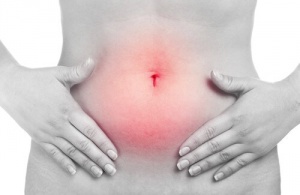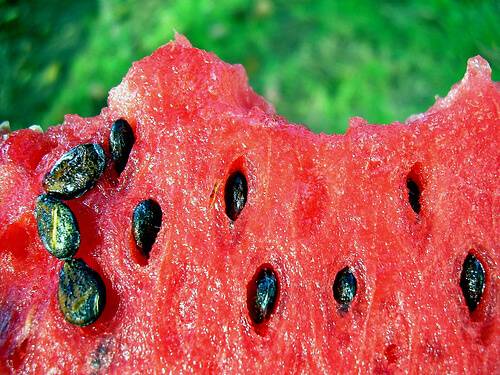Natural Remedies to Reduce Abdominal Swelling


Written and verified by psychologist Valeria Sabater
We’ve all experienced a bloated stomach after eating a heavy meal. There are many other causes too though, and in today’s article we show you how to reduce abdominal swelling.
When our stomachs bloat it just look like we’ve put on a load of weight. We feel so uncomfortable, and feel bad about ourselves. We can, however, reduce abdominal swelling with a few simple pieces of advice, mentioned below, which you can incorporate into your diet.
What causes abdominal swelling?
Eating too quickly
Some people think that if they don’t eat fast, they’ll never get rid of the hunger. But just the opposite is true. You’ll continue to feel hungry, because the feeling of fullness takes 20 to 25 minutes to reach the brain.
If you don’t chew your food well, you aren’t allowing the enzymes to enter your saliva and combine correctly with the carbohydrates. This means that your food will not ferment as it should in the intestines.
What can I do to avoid eating so quickly?
One option is to start your meals by serving each dish individually, starting with a salad.
Too much fried food in your diet?

Battered food, fried potatoes, casseroles, and stews all use a lot of oil in their preparation. These fats are not easily digested. They stay in our stomach, and swell it after each meal.
Solutions: Cook your food on a griddle, in the oven, or steam it rather than frying. Olive oil penetrates foods less than other oils. It is always better to let fried foods sit on a paper towel for a while, in order to absorb the excess oil.
Fizzy drinks
Drinking fizzy drinks obviously fills your belly with gas. If they contain sugar, then we are consuming what are known as “empty calories”. These give us energy, but to weight gain. Carbonated water, while it doesn’t contain calories, does also swell the stomach. The results are even worse you drank during meals.
Fiber in moderation
If we don’t eat enough fiber then it’s likely that we’ll get constipated. However, eating more than what the body needs is also bad. It’s best to eat fiber in moderation, as too much leads to diarrhea and abdominal swelling.
Read more: How to Treat Constipation Without Laxatives
Look after your digestive enzymes
Eating all of your food with processed flour, like breakfast cereals, bread, cooking, pasta, and even rice, depletes our digestive enzymes as these foods don’t contain any enzymes. This results in weaker digestive powers, which, in the end, leads to abdominal swelling and gases.
Whole foods
The nutritional value of whole foods are unbeatable: vitamins, minerals, fiber, and antioxidants. They also provide the enzymes in our digestive system with energy to help reduce abdominal swelling.
Recommended diet to reduce abdominal swelling
- Fresh fruit is very easily digested. It contains fiber and large amounts of water. It also has very little fat, and so a fruit salad for dinner is an excellent option. Good options are watermelon, apricot pieces and cherries. If possible, use a good variety of different fruits.
- Salads that combine lettuce, corn, spinach, and fruit, like pineapple and papaya, are excellent for digestion. It’s always best to include fruit in your meals.
- Sprouts, soya, alfalfa, and lentils. All of these are very healthy foods, loaded with vitamins and minerals, and low in fat. They are perfect in vegetable stews, soups, and cold salads. They can even be included in tortillas!
- Sauerkraut, or fermented cabbage. This contains very beneficial dietary fiber, thanks to the process of fermentation that this food goes through. As a result, it is much more digestible, and it’s great in salads. We can reduce the excess salt by adding water to it just before serving.
- Horchata (a milky Spanish drink made from tiger nuts and almonds) makes a very pleasant beverage. It also helps to reduce abdominal swelling.
All cited sources were thoroughly reviewed by our team to ensure their quality, reliability, currency, and validity. The bibliography of this article was considered reliable and of academic or scientific accuracy.
- A., A., S., K., F.A., U. R., & A., M. (2016). The curious case of a swollen belly: Myxedema ascites. American Journal of Gastroenterology. https://doi.org/10.1038/ajg.2016.374
- Chys Brecht, Bamelis Bruno, Van Renterghem Sofie, Mondelaers Veerle, Van Laecke Erik, A. F. (2017). An unusual swollen belly. Belgian Journal of Paediatrics .
- Swollen Belly Syndrome. (2016). In Encyclopedia of Parasitology. https://doi.org/10.1007/978-3-662-43978-4_3061
- MedlinePlus. Abdomen hinchado. https://medlineplus.gov/spanish/ency/article/003122.htm
- MedlinePlus. Trastornos del metabolismo de los lípidos. https://medlineplus.gov/spanish/lipidmetabolismdisorders.html
- Nutr. Hosp. vol.22 supl.2 Madrid may. 2007. Evaluación de la absorción y metabolismo intestinal. http://scielo.isciii.es/scielo.php?script=sci_arttext&pid=S0212-16112007000500002
- Servicio Madrileño de Salud. RECOMENDACIONES DIETÉTICO NUTRICIONALES “en el síndrome de malabsorción de grasae insuficiencia pancreática”. http://www.madrid.org/cs/Satellite?blobcol=urldata&blobheader=application%2Fpdf&blobheadername1=Content-disposition&blobheadername2=cadena&blobheadervalue1=filename%3D37.MALA+ABSORCI%C3%93N+DE+GRASA+E+INSUFICIENCIA+PANCRE%C3%81TICA.pdf&blobheadervalue2=language%3Des%26site%3DPortalSalud&blobkey=id&blobtable=MungoBlobs&blobwhere=1352869770846&ssbinary=true
This text is provided for informational purposes only and does not replace consultation with a professional. If in doubt, consult your specialist.









